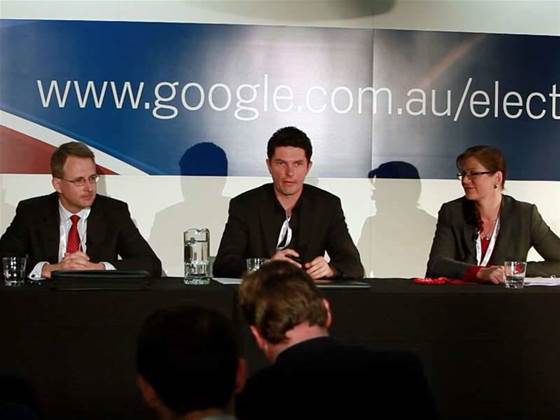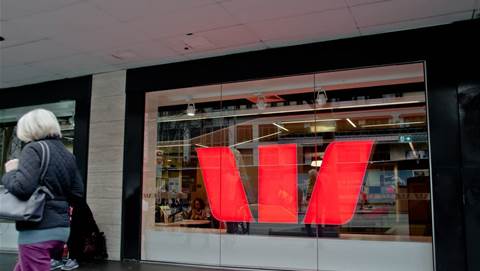Politicians from the Labor, Liberal and Greens parties fielded questions on their technology policies - or lack thereof - at Google's Pyrmont, Sydney headquarters today.

The debate followed Google's launch of its Election 2010 portal, which features tools for finding out about issues, candidates and electorates in the lead up to the August 21 election.
Google also launched its Student Voice initiative, which invited students aged between 15 and 17 to vote in a simulated election from 9 to 12 August.
Greens Senator Scott Ludlam welcomed online political discussions as an antidote to the "excruciatingly boring" portrayal of politics in the traditional media, such as Sunday's televised leadership debate.
While online discussions were "completely unregulated and anarchic", the debate was "a form of political anaesthetic where their [Gillard and Abbott] only job is to not stuff anything up," he said.
"Politics is too important to be left to the politicians," he told students from Georges River College and Reddam House who were present at the launch.
Meanwhile, Labor Senator Kate Lundy described Google's Election 2010 as consistent with the incumbent government's Government 2.0 values.
"I think that governments that don't engage with citizens in their digital lives aren't capable of representing their people," she said.
Lundy highlighted the Digital Education Revolution, $43 billion investment in the National Broadband Network (NBN) and recent Declaration of Open Government as examples of Labor wins in the technology sector.
"We've invested so much into great policy across the whole area of ICT and the digital economy," she said.
National Broadband Network
Liberal member for Bradfield, Paul Fletcher, underscored the Opposition's concern and scepticism about a range of Labor's technology proposals.
"I am root and branch opposed to Labor's NBN policy," he said. "Technology investment is risky. There's a real question as to whether it is wise to put $43 billion at risk."
Fletcher highlighted the French Minitel terminals and Hutchison's early foray into video telephony in Australia as examples of failed investments, noting that "the field of technology is littered with success and it's also littered with failure".
With an average connection speed of 2.6 Mbps, Australia has been ranked by content-distribution service Akamai as the 50th fastest broadband nation in the world, behind New Zealand with 2.9 Mbps, and the U.S. with 4.7 Mbps.
But despite his NBN reservations, Fletcher - who worked as Optus's Director of Corporate and Regulatory Affairs between 2000 and 2008 - declined to describe how he, or his party, would improve broadband in Australia.
"We will be announcing our plans in due course ... when the appropriate time comes," he said.
Ludlam supported the NBN build. However, he opposed Labor's long-term plan of privatising NBN Co, drawing parallels to Liberal Government's privatisation of Telstra in the late-1990s.
"What we're trying to do here is fix the mess that was left by the privatisation of Telstra," he said.
"We're essentially reversing the privatisation of Telstra [by creating NBN Co] ... We don't want to go back down that path."
Mandatory ISP-level internet filtering
Labor Senator Lundy addressed questions about Labor's controversial internet filtering proposal by highlighting Communications Minister Stephen Conroy's recently proposed review of Refused Classification (RC) guidelines.
Lundy, who has previously suggested an opt-out - rather than mandatory - internet filtering regime, acknowledged that filtering was a "controversial issue".
The best approach to cybersafety would be through educating children and their parents on safe internet use, she suggested.
Liberal representative Fletcher criticised the RC review as something that looked "surprisingly like an attempt to kick that [filtering] issue into touch".
"The advice that comes from engineers is that it [an ISP-level filter] is very difficult, technically, to implement.
"It's a very confusing, muddled area of policy," he said, questioning the Labor Government's internet filtering commitment after having scrapped Liberal's voluntary NetAlert filtering scheme.
However, Fletcher would not discuss whether or not NetAlert, or any form of voluntary filtering, would be revived under an elected Liberal Government. Shadow Communications Minister Tony Smith has been equally unwilling to disclose Liberal technology policies.
Ludlam, who has long opposed mandatory filtering, said the Liberals were likely to support Labor's filtering proposal under Tony Abbott's leadership.
"I think the Liberals are ducking and weaving; I think internally, they're split ... but the fact is, the party is led by Tony Abbott who is deeply conservative," he said.
"It wouldn't surprise me at all that when the Government finally moves to legislate mandatory net censorship - which is still their policy - I'm still very worried that the Liberals are going to vote for it."




_(22).jpg&h=140&w=231&c=1&s=0)
_(23).jpg&h=140&w=231&c=1&s=0)



_(26).jpg&w=100&c=1&s=0)

 iTnews Executive Retreat - Security Leaders Edition
iTnews Executive Retreat - Security Leaders Edition












_(1).jpg&h=140&w=231&c=1&s=0)



